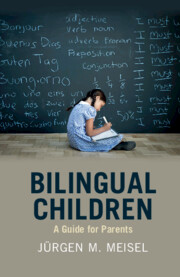Book contents
- Bilingual Children
- Bilingual Children
- Copyright page
- Dedication
- Contents
- Preface
- Abbreviations
- 1 Bilingualism in Early Childhood
- 2 How Infants Become Native Speakers
- 3 Two Languages in One Mind
- 4 Keeping Languages Apart
- 5 Language Dominance
- 6 Trilingual and More
- 7 The Age Question
- 8 Benefits and Advantages of Child Bilingualism
- Bibliography
- Index
- References
8 - Benefits and Advantages of Child Bilingualism
Published online by Cambridge University Press: 08 June 2019
- Bilingual Children
- Bilingual Children
- Copyright page
- Dedication
- Contents
- Preface
- Abbreviations
- 1 Bilingualism in Early Childhood
- 2 How Infants Become Native Speakers
- 3 Two Languages in One Mind
- 4 Keeping Languages Apart
- 5 Language Dominance
- 6 Trilingual and More
- 7 The Age Question
- 8 Benefits and Advantages of Child Bilingualism
- Bibliography
- Index
- References
Summary
Bilinguals are not merely able to express an idea in two languages, they also have the opportunity to be immersed in two cultures. Bilingualism is indeed the key to biculturalism. The discussions in chapters 3 through 7 have shown that simultaneous acquisition of two or more languages from birth does not represent a risk for children’s cognitive or social development. But does it offer benefits not available to monolinguals? Perhaps not all the ones that some parents are hoping for, but certainly a number of important ones. Bilinguals outperform monolinguals in their reading and writing abilities, and they are more successful in learning additional languages. They are also credited with enhanced mental flexibility. Executive function plays a crucial role here, because it subserves the mental activities involved in the kinds of language use that have been found to result in cognitive advantages of bilinguals. Bilingualism can contribute to better executive function and consequently also to better aging, but other cognitive activities can have similar effects. Another important benefit is that bilinguals are qualified to act as mediators between cultures, in the family or in the larger society.
- Type
- Chapter
- Information
- Bilingual ChildrenA Parents' Guide, pp. 221 - 244Publisher: Cambridge University PressPrint publication year: 2019

